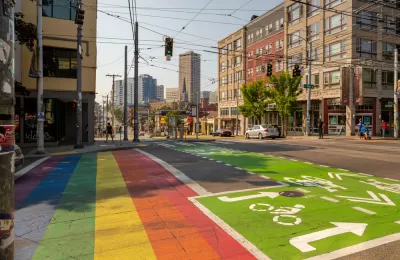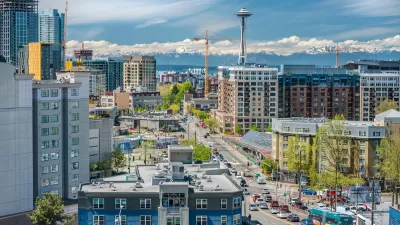A proposed transportation impact fee, years in the making, is stirring a controversy at a time of declining permitting and construction activity in the city of Seattle.

The Seattle City Council is considering transportation impact fees for development in the city.
Reporting for The Urbanist, Ryan Packer shares the background on a years-long process of exploring a new transportation impact fee, which has recently yielded a potential project list before the City Council for consideration.
Notably, Seattle has no existing impact fee—for transportation, fire protection, nor schools—like most cities in Washington State, according to Packer. Hence the cities ongoing efforts, dating back to 2014, to implement an impact fee.
There’s one big catch, however, to the idea of adding a charge on new residential or commercial construction to help fund infrastructure improvements: At the moment impact fees are under consideration by the City Council, “the City of Seattle is facing a revenue forecast that shows multifamily home construction slowing significantly, prompting the question of whether the timing is right to add yet another cost barrier onto the construction of new housing,” writes Packer.
The impact fee is currently held up by legal challenges to the Determination of Non-Significance (DNS) required by the Washington State Environmental Protection Act (SEPA).
“Until that appeal is resolved (a hearing is now scheduled for late May), Seattle cannot move beyond the initial rate study for impact fees, which includes a potential ceiling for the fee. Only certain transportation projects are eligible to be funded by impact fees, and often only certain elements of those projects as well,” reports Packer.
Impact fees are frequently provoke opposition from developers and YIMBYs for creating another expense for development projects. A lot more detail about the politics and potential consequences of the proposed impact fee can be found at the link below.
FULL STORY: As Development Slows, Seattle Eyes Transportation Impact Fee Projects

Montreal Mall to Become 6,000 Housing Units
Place Versailles will be transformed into a mixed-use complex over the next 25 years.

Planetizen Federal Action Tracker
A weekly monitor of how Trump’s orders and actions are impacting planners and planning in America.

DARTSpace Platform Streamlines Dallas TOD Application Process
The Dallas transit agency hopes a shorter permitting timeline will boost transit-oriented development around rail stations.

Study: 4% of Truckers Lack a Valid Commercial License
Over 56% of inspected trucks had other violations.

Chicago Judge Orders Thousands of Accessible Ped Signals
Only 3% of the city's crossing signals are currently accessible to blind pedestrians.

Philadelphia Swaps Car Lanes for Bikeways in Unanimous Vote
The project will transform one of the handful of streets responsible for 80% of the city’s major crashes.
Urban Design for Planners 1: Software Tools
This six-course series explores essential urban design concepts using open source software and equips planners with the tools they need to participate fully in the urban design process.
Planning for Universal Design
Learn the tools for implementing Universal Design in planning regulations.
City of Mt Shasta
City of Camden Redevelopment Agency
City of Astoria
Transportation Research & Education Center (TREC) at Portland State University
US High Speed Rail Association
City of Camden Redevelopment Agency
Municipality of Princeton (NJ)





























